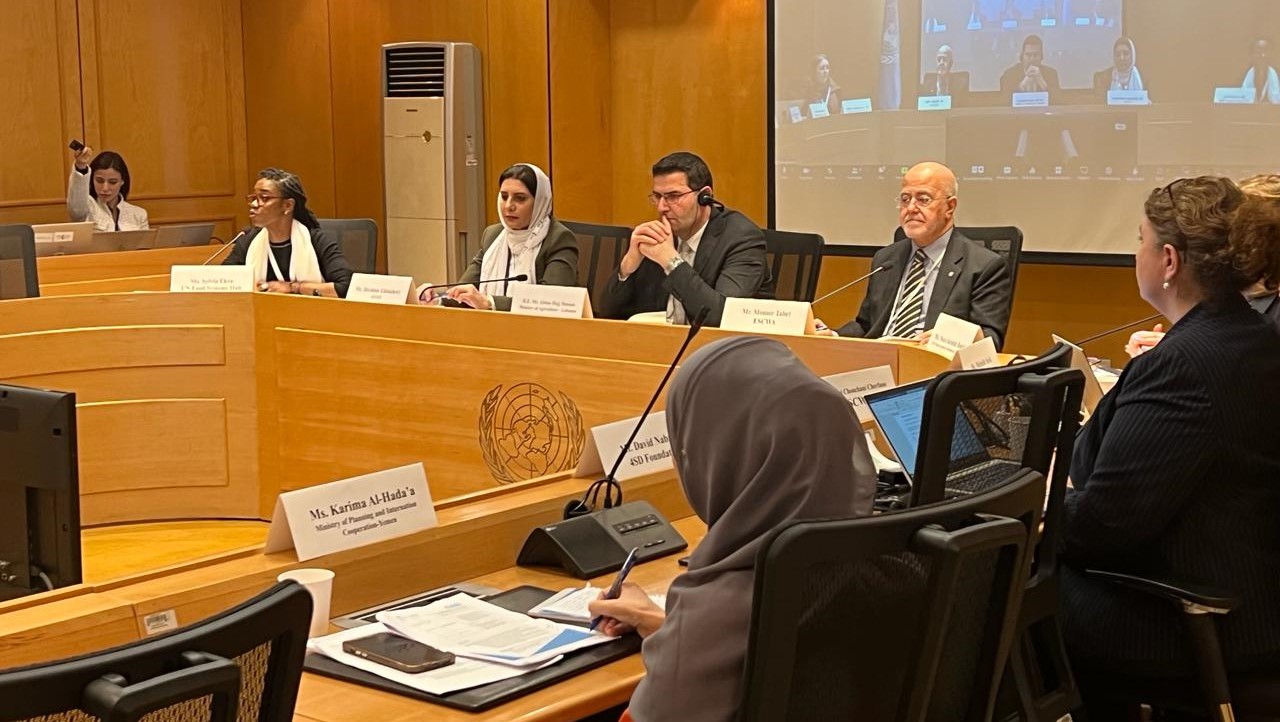Regional insights: National Convenors review food systems transformation progress in the Arab landscape

Beirut, Lebanon: During the Arab Forum for Sustainable Development (AFSD) 2024, the UN Food Systems Coordination Hub in close partnership with the United Nations Economic and Social Commission for Western Asia (ESCWA) and FAO, organized two events that focused on the transformation of food systems within the Arab region. These gatherings brought together a diverse group of food systems actors, including National Convenors, experts, and representatives from civil society and international organizations, all united in their commitment to reshaping food systems in the face of contemporary challenges.
Regional Meeting with National Convenors for Near East and North Africa
On 6 March 2024, the Regional Meeting convened National Convenors from the Near East and North Africa to assess progress and foster knowledge exchange on food systems transformation. The event emphasized the necessity of aligning food systems with climate action initiatives, welcomed the Hub Convergence initiative, while highlighting the importance of integrated approaches to achieve sustainability and resilience. Topics discussed spanned governance mechanisms, financing, monitoring frameworks, and the crucial role of regional cooperation in ensuring successful execution and mutual progress.
In his introductory remarks, H.E. Mr. Abbas AL Hajj Hassan, Minister of Agriculture in Lebanon, underscored the importance of global solidarity and support for both local and displaced populations, as well as the need for cohesive legislation and execution. H.E. Mr. Ibrahim Eldukheri, Director-General of the Arab Organization for Agricultural Development (AOAD), highlighted the significance of strategic partnerships and enhanced access to technology. Mr. Mounir Tabet, Deputy Executive Secretary of ESCWA, pointed out the critical need for investments in rural development, innovation, and the creation of equitable food systems. Ms. Nora Ourabah, FAO Representative in Lebanon, reiterated the reaffirmed commitment to strategic collaboration among UN agencies and with countries to facilitate a successful transformation of food systems.

Opening session of the Regional Meeting with National Convenors.
Country progress updates
Participants discussed the significant strides made since the UN Food Systems Summit +2 (UNFSS+2) Stocktaking Moment in July 2023, with countries actively engaging in multi-stakeholder dialogues, developing platforms for collaboration, and integrating national pathways into their policies.
Countries have initiated various activities aligned with the Secretary-General's Call to Action, such as the launch of Lebanon’s first national pathway, Egypt's formation of a national committee for sustainable food systems involving multiple stakeholders and governmental institutions, Sudan's development of a pathway action plan through multi-stakeholder dialogues, and Jordan's creation of a platform for food security and nutrition with broad participation across relevant ministries and stakeholders.
Despite the complexities introduced by multiple crises, including conflicts and climate change, the National Convenors’ resolve to continue advancing the food systems agenda remained unwavering.
Following a presentation on the Climate Convergence Initiative – a Hub initiative supported by the 4SD Foundation – National Convenors shared their experiences on integrating efforts in food systems and climate action. Carol Chouchani Cherfane, the Cluster Lead for Climate Change and Natural Resource Sustainability at ESCWA, delivered a presentation on climate finance where she outlined the present landscape of financial flows within the region and emphasized the urgent need to address both climate change and food system challenges at once. She underscored the critical issue of climate change intensifying existing problems such as water scarcity and soil degradation, noting that twelve states in the region are facing absolute water scarcity.
The full summary meeting report of the regional meeting will be available soon. Find the presentations from the Regional Meeting here.
Food for Thought: Unpacking UNFSS+2 Outcomes in the Arab Region and Charting the Action Plan for Resilient Food Systems Transformations
On 7 April 2024, following the regional meeting, a special session on "Unpacking UNFSS+2 Outcomes in the Arab Region and Charting the Action Plan for Resilient Food Systems Transformations" delved into the specifics of implementing the Secretary-General's Call to Action in the Arab context.
Ms. Sylvia Ekra, Deputy Director of the UN Food Systems Coordination Hub, highlighted the pivotal role of collaboration in the Arab region, with 17 National Convenors and 11 national pathways already established. “Our strength lies in regional collaboration,” she emphasized, pointing out the strong participation of Arab leaders at UNFSS+2 as a testament to their recognition of the transformative potential of sustainable food systems.
H.E. Ms. Inaya Ezzeddine, National Convenor for Lebanon, detailed key outcomes of the regional meeting, emphasizing the Arab region's significant development challenges—exacerbated by crises like COVID-19, conflicts, and climate change—that impede progress towards the Sustainable Development Goals. The way forward was outlined with a focus on adopting a food systems approach to achieve food security, a human-centered strategy, multi-level cooperation, and a strong call for governance reform, regional integration, and climate action to address these systemic issues and promote sustainable development.
The following roundtable discussion emphasized the critical areas identified for future food systems development, exploring the region-specific challenges and aligning them with global objectives. The discourse underscored the necessity for collaborative efforts across various sectors to implement sustainable practices, highlighting the roles of private sector engagement, civil society contributions, and the support of regional organizations.
Unified strategies for the Arab region
Both events highlighted the multifaceted challenges facing the Arab region, from developmental setbacks and environmental crises to the repercussions of conflict, notably the situation in Gaza. The discussions offered a platform for sharing strategies that prioritize a human-centered approach, governance reforms, and climate-smart policies, aiming for a comprehensive transformation of food systems. The emphasis was on creating inclusive, sustainable solutions that address the root causes of food systems fragility, enhance legislative support, and foster international cooperation to ensure food security and sustainable development across the region.
These meetings with National Convenors illuminated the path forward for the Arab region, advocating for unified visions, strategic collaborations, and innovative solutions to overcome current challenges and achieve development goals.
Related Links:
